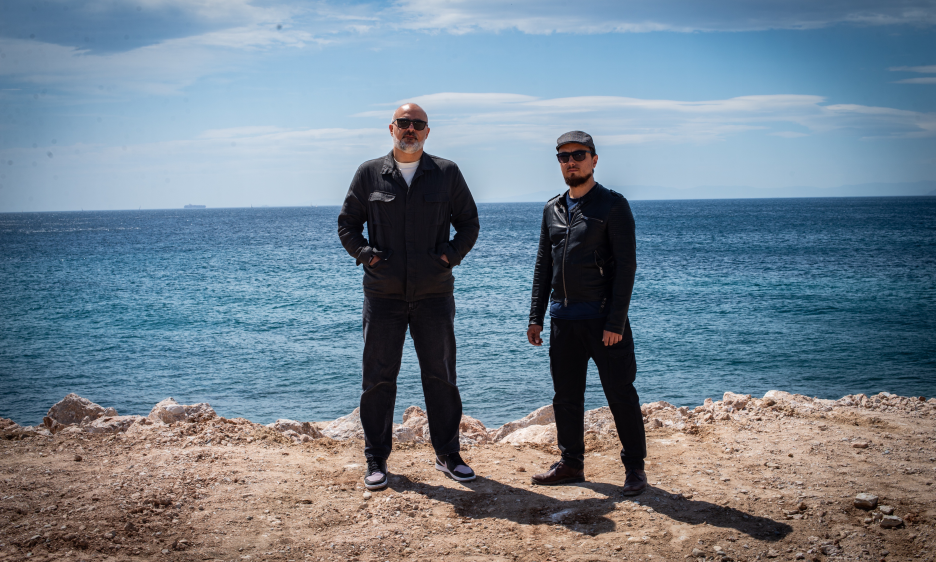Home »
Jazz Articles » Catching Up With » The Ritual Music of Kolida Babo

Our music carries social intention through personal expression.
Socratis Votskos
”
data-original-title=”” title=””>HarrisP draws its name from an ancient winter ritual of fire and dance. Their album Spirits Of Mauronoros (Veego Records, 2024) finds inspiration in this remote borderland near Albania, where emptiness and life intertwine.
Between Athens and Aridaia, they blend Armenian duduk melodies with Greek folk traditions, free jazz, and electronic textures. The result maps territory both ancient and modern, expressing Greece’s complex history through sound.
“I first encountered this tradition in Aridaia, Socratis’s hometown,” Harris P. recalls. “Coming from Athens, I had never seen anything like it. While Greece has many traditions combining dancing and music, this was different.”
Votskos explains the medieval custom that became their namesake: “‘Kolida Babo refers to a carol tradition, specifically the day before the actual carols. People gather to build large fires and dance around them with local music. The name itself has layers ’Babo’ means grandmother in the traditional Slavic language that influenced northern Greek dialects. ‘Kolida’ comes from ‘Koliada,’ our word for carols.”
Their collaboration began the night Harris arrived in Aridaia during these fire rituals. “He came to my home studio, and we recorded our first song, ‘Kolida Babo,'” Votskos says.
The Armenian duduk became central to both their music and friendship. “I discovered it through
Djivan Gasparyan
woodwinds
1928 – 2021
”
data-original-title=”” title=””>Djivan Gasparyan‘s collaboration with Michael Brook on Black Rock (Real World Records, 1999),” Harris says. “The sound grabbed me immediately. Living in Greece with its significant Armenian community, this connection felt natural.”
Their recording process stays fluid and spontaneous. “We limit ourselves to three takes maximum during improvisations,” Harris notes. “Ideas might develop independently on various instrumentssynthesizers, baritone saxophones, clarinetsthen we combine recordings between our two cities.”
Votskos’s multi-instrumental approach evolves through improvisation. “Certain combinations emerge organically,” he explains. “We might double bass clarinet with soprano clarinet, though it’s rarely our starting point. The baritone particularly suits our more dynamic pieces.”
The album’s centerpiece, “Pangea’s Journey,” came together differently, recorded during COVID-19 lockdowns. “The concept references Earth’s unified prehistoric continent,” Harris says. “We arranged it around the gaida, a traditional Greek bagpipe, but interpreted through the dudukan approach that might surprise traditional Greek musicians.”
Mauronoros itself holds special resonance. “The old village sits dramatically on a cliff,” Harris describes. “It has remarkable threshing floors ’alonia’circular stone platforms where grain was once separated from stalks. They’re so vast they look like landing sites from above. Its abandonment mirrors broader patterns in Greek history wars, civil conflicts, rural exodus.”
“Our music carries social intention through personal expression,” Votskos reflects. “We don’t presume to transform society, but our creative approach might resonate with listeners, inspiring changes in their own expression or creativity.”
Their work speaks to diverse audiences precisely because it respects traditions while remaining unconstrained by them. As Harris puts it: “We’re not trying to create unprecedented combinations or a new genre. Our music simply expresses our emotional landscape through sound, and we particularly value the dialogue.”
Support All About Jazz

All About Jazz has been a pillar of jazz since 1995, championing it as an art form and, more importantly, supporting the musicians who make it. Our enduring commitment has made “AAJ” one of the most culturally important websites of its kind, read by hundreds of thousands of fans, musicians and industry figures every month.
Go Ad Free!
To maintain our platform while developing new means to foster jazz discovery and connectivity, we need your help. You can become a sustaining member for as little as $20 and in return, we’ll immediately hide those pesky ads plus provide access to future articles for a full year. This winning combination vastly improves your AAJ experience and allow us to vigorously build on the pioneering work we first started in 1995. So enjoy an ad-free AAJ experience and help us remain a positive beacon for jazz by making a donation today.
